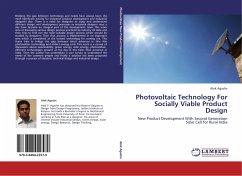
Hardware features in the inclusion.
For a more inclusive competitiveness.
Versandkostenfrei!
Versandfertig in 6-10 Tagen
40,99 €
inkl. MwSt.

PAYBACK Punkte
20 °P sammeln!
Hardware development has driven global growth in areas such as technology, healthcare, economics and education. This study reveals how hardware components in input, output, and processing devices can be the key to unlocking the doors of inclusion for people with disabilities, especially visual and sensory impairments.Based on previous studies, more than 17 years of experience of the authors with emerging technologies and a non-probabilistic judgmental sampling survey of 40 people with disabilities in Ecuador, this study presents valuable information for educational institutions, businesses, pr...
Hardware development has driven global growth in areas such as technology, healthcare, economics and education. This study reveals how hardware components in input, output, and processing devices can be the key to unlocking the doors of inclusion for people with disabilities, especially visual and sensory impairments.Based on previous studies, more than 17 years of experience of the authors with emerging technologies and a non-probabilistic judgmental sampling survey of 40 people with disabilities in Ecuador, this study presents valuable information for educational institutions, businesses, professionals and citizens. The objective is to combat the lack of knowledge about conventional hardware resources that are inclusive, both in old and updated models.The study seeks to channel future production towards technological, academic and industrial accessibility, in line with the sustainable development goals of the United Nations (UN) and the contributions of science. The results of this study are a call to action to make this world more inclusive.














